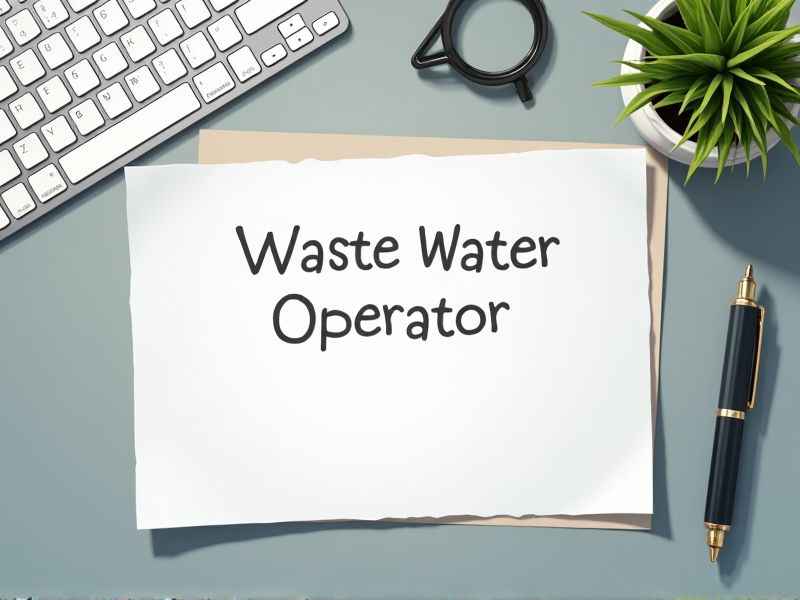
Waste Water Treatment Plant Operators are responsible for managing systems crucial for maintaining environmental standards and public health. Certification ensures these operators have the necessary skills and knowledge to handle potential hazards and complex equipment safely. Regulatory agencies often require specific certifications to ensure compliance with legal and environmental mandates. Below are key certifications you may require as a Waste Water Treatment Plant Operator.
Class I Wastewater Treatment Plant Operator Certification
Class I Wastewater Treatment Plant Operator Certification ensures that operators possess the necessary skills and knowledge to manage and maintain treatment processes effectively. This certification equips operators with an understanding of regulatory compliance, which is essential for meeting environmental protection standards. Certified operators can optimize the treatment process, reducing operational costs and improving plant efficiency. The certification process also enhances public and environmental safety by ensuring wastewater discharge meets quality standards.
Class II Wastewater Treatment Plant Operator Certification
Class II Wastewater Treatment Plant Operator Certification is essential because it ensures operators have the necessary skills and knowledge to manage complex treatment processes effectively. Certification safeguards public health by ensuring treated water meets safety and quality standards. Regulatory compliance requires certified operators to align with environmental regulations and policies. Proper certification can lead to improved plant performance and operational cost savings.
Certified Wastewater Treatment Operator (CWTO) Certification
Certified Wastewater Treatment Operator (CWTO) Certification ensures operators possess the technical skills and knowledge crucial for effective environmental management. Regulatory compliance mandates certified personnel to prevent regulatory fines and ensure water quality standards. Certified operators demonstrate enhanced problem-solving abilities and gain trust to handle complex system malfunctions efficiently. The credential also improves career prospects by differentiating operators in a competitive job market.
Water Environment Federation (WEF) Operator Certification
Obtaining the Water Environment Federation (WEF) Operator Certification ensures that waste water treatment plant operators possess the necessary knowledge to effectively manage and treat waste water processes. This certification reinforces an operator's ability to adhere to industry standards and maintain compliance with environmental regulations, reducing the risk of pollution and environmental harm. Certified operators are better equipped to implement efficient treatment techniques, leading to improved plant performance and resource conservation. The certification process promotes continuous professional development, enabling operators to stay current with advancements in technology and industry practices.
HAZWOPER (Hazardous Waste Operations and Emergency Response) Certification
HAZWOPER certification equips Wastewater Treatment Plant Operators with the skills to safely handle hazardous substances and navigate emergency response situations, ensuring compliance with OSHA regulations. Exposure to hazardous chemicals in wastewater plants presents risks that require specialized training to mitigate health and environmental impacts. Proper certification enhances the operator's ability to implement effective safety protocols and emergency response measures. This training reduces workplace accidents and ensures the well-being of both workers and the surrounding community.
OSHA 10-Hour Safety Certification
The OSHA 10-Hour Safety Certification provides foundational knowledge about health and safety principles, which reduces the risk of accidents in wastewater treatment plants. Regulatory compliance and safety protocols are crucial in such high-risk environments, helping to prevent both personal injury and environmental harm. Certification ensures operators are educated on chemicals, machinery, and emergency responses, increasing both efficiency and safety. Wastewater treatment involves potentially hazardous materials, and trained operators are better equipped to handle emergencies, safeguarding public health.
Confined Space Entry Certification
Confined space entry certification is essential because waste water treatment plants have areas with limited entry and exit points, posing risks to safety. These spaces often contain hazardous gases, such as hydrogen sulfide, which require appropriate training to handle. Certification ensures that operators understand and comply with safety regulations, reducing the risk of accidents. Proper training enhances awareness of necessary safety equipment, ensuring operator protection during maintenance and inspection tasks.
Process Control Systems Certification
Certification in Process Control Systems equips Waste Water Treatment Plant Operators with the technical knowledge necessary to manage complex treatment processes. Operators need to ensure regulatory compliance, and certified training provides insights into meeting stringent environmental standards. Effective process control enhances operational efficiency, reducing the risk of equipment failure and environmental hazards. Certification demonstrates a commitment to safety and quality, improving trust with stakeholders and potentially leading to career advancement opportunities.
Industrial Safety and Health Certification
Industrial Safety and Health Certification ensures that wastewater treatment plant operators understand and adhere to safety protocols, minimizing the risk of accidents. Compliance with these safety standards is crucial for protecting both the operators and the surrounding community from potential hazardous exposure. Certified operators are equipped with the knowledge to handle emergency situations efficiently, reducing the potential for environmental contamination. Certification also reinforces the industry's commitment to regulatory standards, maintaining legal compliance and enhancing public trust.
Environmental Management Systems (EMS) Certification
Environmental Management Systems (EMS) Certification ensures that a wastewater treatment plant operates within compliance with legal and environmental regulations, reducing the risk of violations. A certified EMS provides a structured approach for managing environmental performance, which leads to more efficient resource use and cost savings. It demonstrates a commitment to sustainability, improving public perception and trust among community stakeholders. The certification process fosters continuous improvement by regularly monitoring and reviewing environmental objectives, thereby enhancing operational efficiency.
Summary
As a Waste Water Treatment Plant Operator, obtaining certifications enhances your credibility and professionalism. Certifications lead to improved knowledge and skills, increasing operational efficiency and plant performance. By achieving certifications, career advancement opportunities become more accessible, resulting in potential increases in salary and job satisfaction. Your facility also benefits from reduced compliance risks and improved safety standards.
